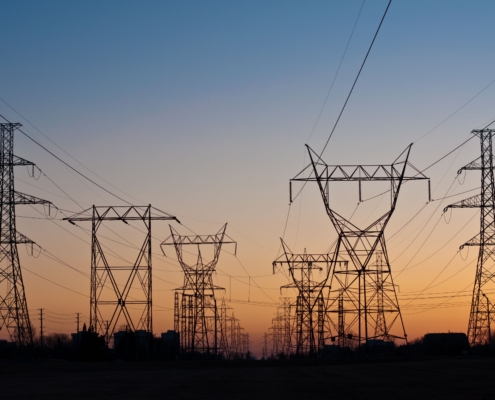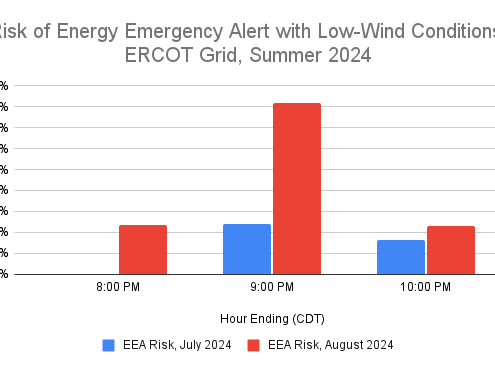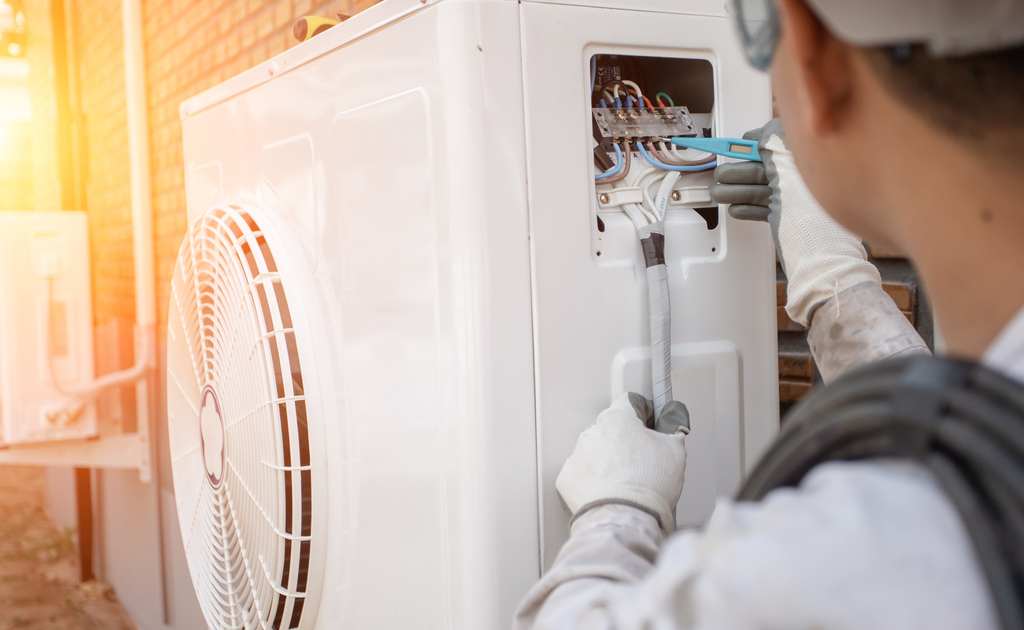Last Updated on May 22, 2022 by Mary Pressler
Electric Heat Pumps: Air Conditioning Savings and Carbon-Free Heating
Natural gas is the most common fuel for water and indoor heating, given its abundance and the low cost it can achieve. However, do not assume natural gas is a clean heat source just because its name has the word “natural”. Although its emissions are lower that those of coal and oil, natural gas is a fossil fuel at the end of the day.
When heating systems run with electricity, you can potentially have zero-emissions heat by using clean power. Unfortunately, gas-fired heating systems are preferred in homes and businesses, due to the high running cost of resistance heaters. However, electric heat pumps are a modern technology that can match the cost of gas without combustion and emissions.
What Is a Heat Pump?
In simple terms, a heat pump can be described as a refrigerator or air conditioner designed to operate in reverse. While normal cooling equipment removes heat from a closed spaces to release it outside, a heat pump gathers heat from the environment and supplies it to an indoor area or a container. Have you noticed how air conditioners release heat outdoors? Well, if you reverse the direction of heat flow, you can have that effect indoors during the winter.
A heat pump has the same elements as an air conditioner: an evaporator, a compressor, a condenser and an expansion valve. The difference is that these elements are configured to move heat into a building, while an air conditioner extracts heat.
You may wonder how a heat pump manages to extract heat from cold outdoor air during winter? The process is the same as when air conditioners remove heat from indoor areas that are cooler than outdoor air. With repetitive evaporation, compression, condensation and expansion of a refrigerant fluid, air conditioners and heat pumps can move heat against its normal direction.
Some heat pumps offer reversible operation, which means they can operate as normal air conditioners during summer. If your current air conditioner and space heater are both old, consider a reversible heat pump to replace both. That way, you can consolidate two appliances in one, while reducing both your power bills and your environmental footprint.
How Efficient Are Heat Pumps?
The efficiency of heat pumps depends on the mode you are currently using – they have both a cooling efficiency and a heating efficiency.
- When in cooling mode, modern heat pumps can be as efficient as the latest mini-split units. Compared with a window-type air conditioner, a heat pump in cooling mode can easily save over 60%.
- In heating mode, heat pumps deliver between 2 and 4 watts of heat for every watt of electricity consumed, where efficiency varies depending on the exact heat pump model.
The cooling efficiency of a heat pump is normally described with the same metric used for air conditioners, the Seasonal Energy Efficiency Ratio (SEER). On the other hand, the heating efficiency is described with the Heating Seasonal Performance Factor (HSPF). Both the SEER and HSPF describe heat moved per unit of electricity, similar to how the fuel economy of a car is measured in miles per gallon. Just like a higher MPG value reduces fuel expenses, a higher SEER and HSPF reduce cooling and heating expenses.
Since electric resistance heaters are expensive to run, you may have doubts about replacing a gas heater with an electric heat pump. However, you can avoid issues by purchasing a heat pump with the ENERGY STAR label from the US Environmental Protection Agency. Basically, the label means the unit has been subjected to rigorous testing, concluding that it meets the rigorous standards of the US EPA.
Heat pumps can also be an attractive investment for electricity consumers who want to bring their carbon footprint down to zero. Since you can choose your electricity provider freely in Texas, it is just a matter of finding power companies that supply 100% renewable energy.
How Are Heat Pumps Classified?
Normally, heat pumps are classified based on the source used for heat extraction. Their names are very self-explanatory:
- Air-source heat pumps (ASHP) extract heat from the surrounding air. In simple terms, they refrigerate outdoor air to remove heat from it, and then this heat is delivered indoors.
- Ground-source heat pumps (GSHP) take advantage of the relatively stable underground temperatures throughout the year.
- Water-source heat pumps (WSHP) use a natural body of water or a piping loop to exchange heat. When a water loop is used, the system is complemented with a larger ASHP or GSHP to compensate for any extra cooling or heating needed.
Can Heat Pumps Really Beat the Cost of Natural Gas?
As mentioned above, natural gas heaters have a much lower running cost than electric resistance heaters. However, heat pumps can compete with gas heaters thanks to their high efficiency.
Before comparing heating systems, we must understand the differences in how heat, electricity and gas are measured.
- Heat is normally measured in British Thermal Units (BTU). 1 BTU is the amount of heat needed to increase the temperature of 1 lb of water by 1°F.
- Electricity is measured in kilowatt-hours (kWh).
- Gas is measured in hundreds of cubic feet (Ccf) or thousands of cubic feet (Mcf).
Heat consumption is normally measured in BTU, but utility companies do not bill you for BTU because they do not deliver heat directly. Your heating expenses are normally paid based on your consumption in kWh (electricity) or Mcf (gas).
- Gas prices vary a lot throughout the year in Texas: According to the US Energy Information Administration, they go below 10 USD/Mcf during winter, increasing above 20 USD/Mcf during summer.
- On average, the electricity price in Texas is 11 cents/kWh.
We will compare the operating cost of a resistance heater, a gas heater and a heat pump based on a hot water system delivering 100,000 BTU. The concept of the energy factor (EF) is useful in water heating applications: it is the conversion ratio from energy consumed to heat delivered. In this example, the following energy factors are assumed:
- Natural gas heater = 0.67
- Resistance heater =0.95
- Heat pump = 2.5
The required energy input for each case would be the following:
| Heater Type | Heat Output | Energy Input |
| Natural gas | 100,000 BTU | 100,000 BTU / 0.67 = 149,254 BTU |
| Resistance | 100,000 BTU | 100,000 BTU / 0.95 = 105,263 BTU |
| Heat pump | 100,000 BTU | 100,000 BTU / 2.5 = 40,000 BTU |
However, these energy inputs do not make sense unless we convert them to the actual input used by each device. Electric heaters use kilowatt-hours, and gas consumption is normally measured in Mcf. The following conversions are useful in this step:
- 1 kWh is equivalent to 3412 BTU
- 1 Mcf of gas contains 1.037 million BTU
Once we represent the input of each heater in the unit used for billing, the following result is obtained:
| Heater Type | Input |
| Natural gas | 0.14 Mcf |
| Resistance | 30.85 kWh |
| Heat pump | 11.72 kWh |
Assuming a gas price of $10/Mcf and an electricity price of $0.11/kWh, the cost of delivering 100,000 BTU with the three heater types is the following:
| Heater Type | 100,000 BTU Cost |
| Natural gas | $1.40 |
| Resistance | $3.39 |
| Heat pump | $1.29 |
Note how the electric resistance heater is the most expensive to operate, by far. However, the natural gas heater and the heat pump have a similar running cost. If the analysis was repeated for space heating, similar results could be expected.
In Conclusion
Heat pumps are an innovative technology that can be used for air conditioning, space heating and domestic hot water. They offer the efficiency of a modern ductless air conditioner when used for space cooling, and can match the cost of natural gas in space heating and domestic hot water systems, without the emissions.
Also keep in mind that the Texas electricity market is deregulated, but the natural gas market is not. As a result, you can choose your electricity provider but not your gas provider. Since heat pumps run only with electricity, they give your more control over your heating expenses. If you find a favorable electricity plan in www.quickelectricity.com while using an electric heat pump, you no longer have to worry about volatile gas prices.
Share this entry
 https://quickelectricity.com/wp-content/uploads/2024/07/Lubbock-Electricity-Bill-Explained-scaled.jpg
1360
2048
Mary Pressler
https://quickelectricity.com/wp-content/uploads/2021/10/Quick-Electricity-Logo--300x79.jpg
Mary Pressler2024-07-21 08:55:502024-07-23 20:14:08Your Lubbock Electricity Bill Explained
https://quickelectricity.com/wp-content/uploads/2024/07/Lubbock-Electricity-Bill-Explained-scaled.jpg
1360
2048
Mary Pressler
https://quickelectricity.com/wp-content/uploads/2021/10/Quick-Electricity-Logo--300x79.jpg
Mary Pressler2024-07-21 08:55:502024-07-23 20:14:08Your Lubbock Electricity Bill Explained https://quickelectricity.com/wp-content/uploads/2024/06/Risk-of-Energy-Emergency-Alert-with-Low-Wind-Conditions-ERCOT-Grid-Summer-2024.png
371
600
Mary Pressler
https://quickelectricity.com/wp-content/uploads/2021/10/Quick-Electricity-Logo--300x79.jpg
Mary Pressler2024-06-26 09:47:422024-06-26 09:47:42Texas Electricity Outlook Summer 2024
https://quickelectricity.com/wp-content/uploads/2024/06/Risk-of-Energy-Emergency-Alert-with-Low-Wind-Conditions-ERCOT-Grid-Summer-2024.png
371
600
Mary Pressler
https://quickelectricity.com/wp-content/uploads/2021/10/Quick-Electricity-Logo--300x79.jpg
Mary Pressler2024-06-26 09:47:422024-06-26 09:47:42Texas Electricity Outlook Summer 2024 https://quickelectricity.com/wp-content/uploads/2022/08/Texas-Electricity-Broker-.png
1080
1080
Mary Pressler
https://quickelectricity.com/wp-content/uploads/2021/10/Quick-Electricity-Logo--300x79.jpg
Mary Pressler2024-06-18 16:14:522024-06-22 08:43:08Commercial Energy Broker in Texas
https://quickelectricity.com/wp-content/uploads/2022/08/Texas-Electricity-Broker-.png
1080
1080
Mary Pressler
https://quickelectricity.com/wp-content/uploads/2021/10/Quick-Electricity-Logo--300x79.jpg
Mary Pressler2024-06-18 16:14:522024-06-22 08:43:08Commercial Energy Broker in Texas https://quickelectricity.com/wp-content/uploads/2024/05/Electricity-Options-Texas.jpg
627
1200
Kelli
https://quickelectricity.com/wp-content/uploads/2021/10/Quick-Electricity-Logo--300x79.jpg
Kelli2024-05-14 04:05:352024-05-14 04:05:35Demystifying Energy Contracts: What Texans Need to Know
https://quickelectricity.com/wp-content/uploads/2024/05/Electricity-Options-Texas.jpg
627
1200
Kelli
https://quickelectricity.com/wp-content/uploads/2021/10/Quick-Electricity-Logo--300x79.jpg
Kelli2024-05-14 04:05:352024-05-14 04:05:35Demystifying Energy Contracts: What Texans Need to Know https://quickelectricity.com/wp-content/uploads/2024/04/How-to-Cut-Monthly-Expenses.jpg
412
618
Mary Pressler
https://quickelectricity.com/wp-content/uploads/2021/10/Quick-Electricity-Logo--300x79.jpg
Mary Pressler2024-04-21 16:36:072024-04-21 16:37:27How to Cut Monthly Expenses: 9 Clever Ways to Save Money
https://quickelectricity.com/wp-content/uploads/2024/04/How-to-Cut-Monthly-Expenses.jpg
412
618
Mary Pressler
https://quickelectricity.com/wp-content/uploads/2021/10/Quick-Electricity-Logo--300x79.jpg
Mary Pressler2024-04-21 16:36:072024-04-21 16:37:27How to Cut Monthly Expenses: 9 Clever Ways to Save Money https://quickelectricity.com/wp-content/uploads/2019/10/Frontier-Utilities-LOGO.png
800
800
Mary Pressler
https://quickelectricity.com/wp-content/uploads/2021/10/Quick-Electricity-Logo--300x79.jpg
Mary Pressler2024-03-20 13:44:022024-03-20 13:46:02Texas 24 Month Energy Plans
https://quickelectricity.com/wp-content/uploads/2019/10/Frontier-Utilities-LOGO.png
800
800
Mary Pressler
https://quickelectricity.com/wp-content/uploads/2021/10/Quick-Electricity-Logo--300x79.jpg
Mary Pressler2024-03-20 13:44:022024-03-20 13:46:02Texas 24 Month Energy Plans https://quickelectricity.com/wp-content/uploads/2024/03/How-to-improve-energy-efficiency-in-buildings.png
980
1470
Mary Pressler
https://quickelectricity.com/wp-content/uploads/2021/10/Quick-Electricity-Logo--300x79.jpg
Mary Pressler2024-03-08 09:33:152024-03-08 09:39:41Improving Energy Efficiency in Buildings
https://quickelectricity.com/wp-content/uploads/2024/03/How-to-improve-energy-efficiency-in-buildings.png
980
1470
Mary Pressler
https://quickelectricity.com/wp-content/uploads/2021/10/Quick-Electricity-Logo--300x79.jpg
Mary Pressler2024-03-08 09:33:152024-03-08 09:39:41Improving Energy Efficiency in Buildings https://quickelectricity.com/wp-content/uploads/2024/02/Water-Conservation-and-Energy-Efficiency.jpg
788
940
Mary Pressler
https://quickelectricity.com/wp-content/uploads/2021/10/Quick-Electricity-Logo--300x79.jpg
Mary Pressler2024-02-28 08:06:552024-03-12 09:23:09An Eco-Friendly Approach to Water Conservation
https://quickelectricity.com/wp-content/uploads/2024/02/Water-Conservation-and-Energy-Efficiency.jpg
788
940
Mary Pressler
https://quickelectricity.com/wp-content/uploads/2021/10/Quick-Electricity-Logo--300x79.jpg
Mary Pressler2024-02-28 08:06:552024-03-12 09:23:09An Eco-Friendly Approach to Water Conservation https://quickelectricity.com/wp-content/uploads/2024/02/Energy-Efficient-Home-Designs-Windows-.jpg
788
940
Mary Pressler
https://quickelectricity.com/wp-content/uploads/2021/10/Quick-Electricity-Logo--300x79.jpg
Mary Pressler2024-02-08 11:39:572024-02-08 11:44:26Designing an Energy Efficient Home in 2024
https://quickelectricity.com/wp-content/uploads/2024/02/Energy-Efficient-Home-Designs-Windows-.jpg
788
940
Mary Pressler
https://quickelectricity.com/wp-content/uploads/2021/10/Quick-Electricity-Logo--300x79.jpg
Mary Pressler2024-02-08 11:39:572024-02-08 11:44:26Designing an Energy Efficient Home in 2024

